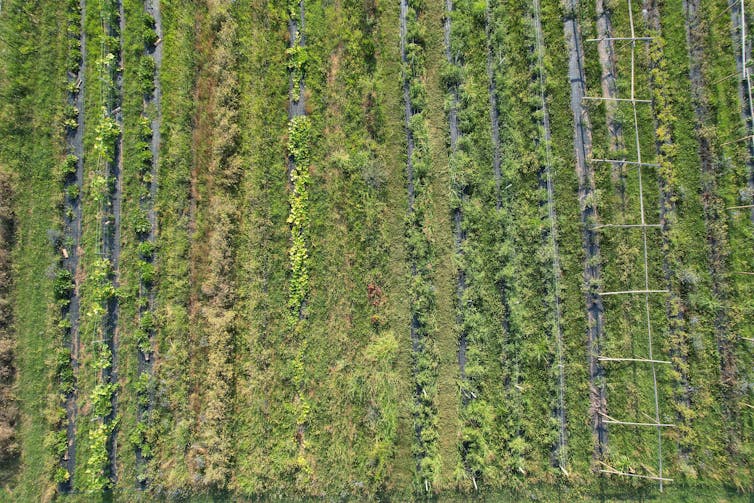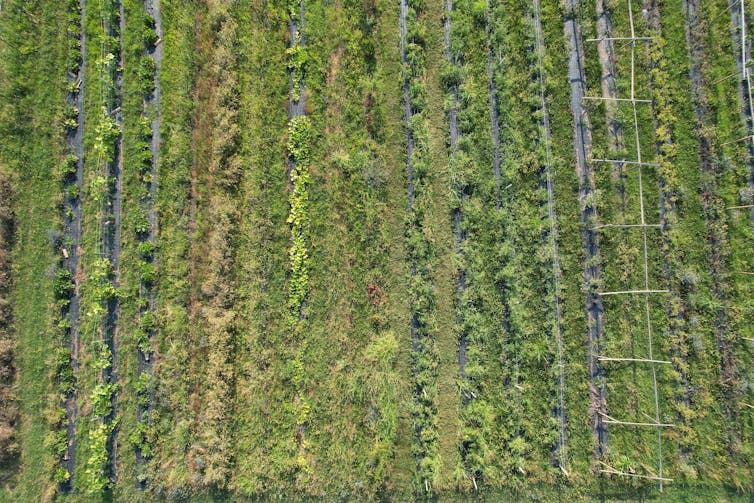
More than 75% of the food consumed in the world today comes from just 12 plants and five animal species. Overreliance on this limited crop, which includes rice, corn and wheat, is damaging the environment and human health, and is putting our global food system at risk of shock. But above all this, it also has negative economic consequences.
Our recent paper shows why crop diversity is key to food system transformation. We suggest that a diversity-based system can provide greater benefits for human health and the planet and distribute financial benefits more equitably.
Unlike mono-industrial agriculture, farms that grow a variety of crops and trees are good for the environment because they increase biodiversity, improve nutrient cycling and carbon sequestration, and support farmers’ livelihoods.
For example, a 2023 study of agroforestry in East Africa suggested that unlike monocultures that produce only grain, multi-cropping systems support livelihoods by producing wood, construction materials, timber, medicinal plants and other non-wood forest products in addition to food.
These farms often support alternatives to conventional agriculture, adopting agricultural practices that include regenerative agriculture and permaculture (ie, sustainable land use).
A 2021 report on renewable agriculture in Africa found that this type of agriculture could add more than US$15 billion (£11.7 billion) to the African economy annually by 2030, rising to US$70 billion by 2040 (one of five of the current agricultural GDP of sub-Saharan Africa). The same report found that this could create more than a million full-time jobs by 2030, and nearly 5 million jobs by 2040.
The current global trade in food crops such as corn, rice, soy, sugarcane and wheat is now controlled by a small number of large companies. They have an impact on all aspects of the food system including production, processing, packaging and distribution.
Viewing food as a profitable investment rather than a source of food has created deep inequalities. Another consequence is foreign direct investment in developing countries that drives out small farmers, contributing to land ownership inequality and worsening food insecurity.
A difference for health
Food and health are closely related and modern medicine is increasingly recognizing the connections between the so-called “gut-immune-brain axis”.
A study conducted on adults in the UK showed that the consumption of processed foods is associated with an increased risk of metabolic diseases such as cancer and heart disease. Yet two-thirds of the calories consumed by young people in the UK come from industrially produced and mass-produced foods.
If the food system is able to provide “real food”, made from a variety of minimally processed foods, it will probably lead to better health outcomes. This can also have major economic benefits, as multiple sources of food improve the gut microbiome, improve physical and mental health, and reduce the burden on health care providers.
Our research is exploring ways to change the food system so that environmental issues, nutritional needs and cultural values come first.
We suggest that diversity should be introduced at all levels of the food system. Diversifying the species of plants and animals from which our food comes is a logical start, but diversity should be the guiding principle of the entire food system.
Production and operation
Multi-crop soils will support a wide range of agricultural practices including agroforestry, permaculture and regenerative agriculture.
Such farms will support a wide variety of habitats, and a wide variety of non-cultivated species. Agricultural diversity can promote a local and regional food economy based on a wide variety of seasonal produce grown on small family farms. These tend to provide economic benefits to a larger section of society.
Trade and transport
The variety of food products will require a variety of food processing and packaging technologies operated by local businesses.
Storing, distributing and transporting a wide variety of crops, vegetables, fruit and meat products will also require infrastructure that supports more local businesses than large supermarkets that rely on supply chains. the world.
Global trade in high-quality food products needs to be better managed, with a focus on land ownership inequality, limited access to markets, and industrial regimes that undermine small producers, processors and share

columbo.photog/Shutterstock
Consumption and nutrition
The production, processing and distribution of food that puts pressure on local and regional economies will also benefit consumers. Many different food sources can improve the diversity of the gut microbiome.
On the other hand, the industrialized food system has made food cheap and plentiful, but it destroys the environment and human health. Locally produced and seasonal food can be expensive, but with government support to control prices and encourage local and regional economies, food can remain affordable.
Governments need to see food as important to the economy, along with things like health care and environmental protection.
Ultimately, a diversity-based food system can provide environmental benefits, reduce climate risk, and improve health and well-being. But it can also transform local and regional food economies and provide safe access to nutritious produce to some of the most needy people in society.
#diverse #diet #worlds #economy #health
Leave a Reply